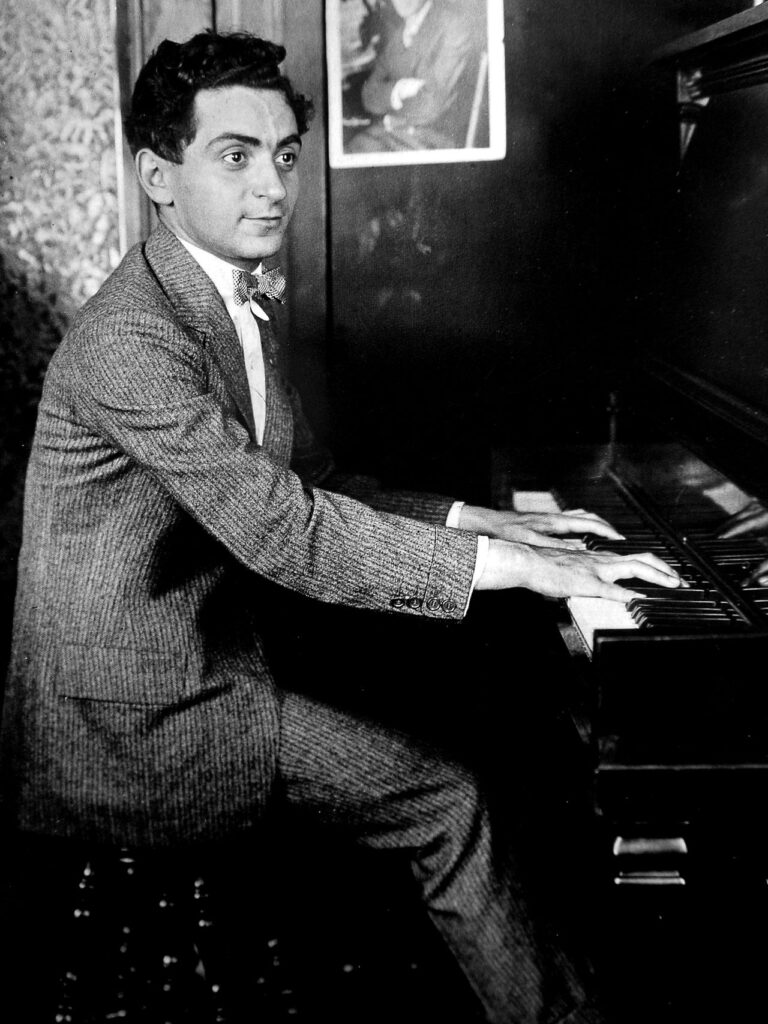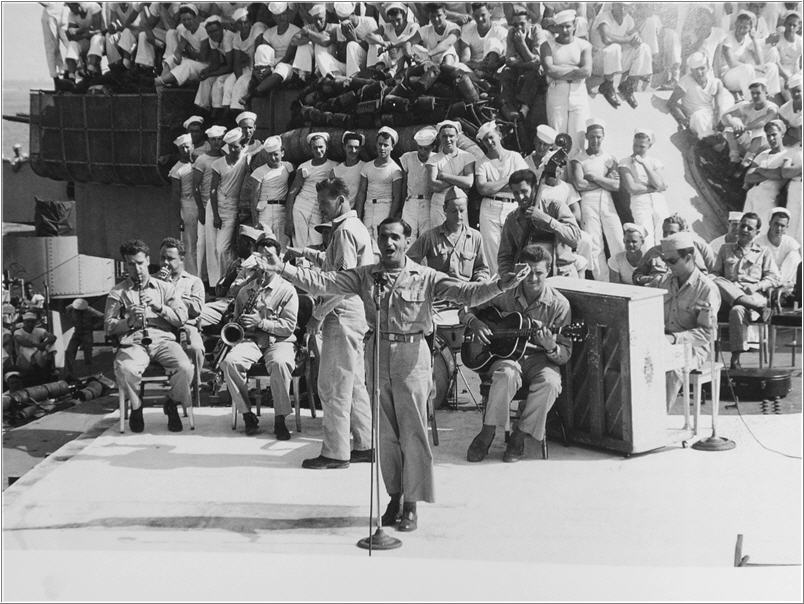Freemasons have changed the world throughout history and inspired the masses by following their intuition, curiosity about the universe, and creative spirit. While a legacy may be created by a man who has led nations or aided humanity through scientific advancements, it can also come from something as simple as a song. In the case of Brother Irving Berlin, his gift to his fellow man was 1,500 compositions, but despite his grand accomplishments, his ever-humble nature reflected the true heart of a Freemason.

At 18 years old, Irving Berlin landed his first music publishing job with the Harry Von Tilzer Company. Courtesy of Life Magazine images.
Irving Berlin
Berlin was perhaps the most celebrated composer of the 20th century. Our younger brethren likely know of his songs, such as “White Christmas,” without knowing his name. His compositions are celebrated classics, but his generous spirit and philanthropic efforts are equally worthy of celebration.
Childhood
Given the name Israel Beilin at birth, Berlin was born on May 11, 1888 in the small Russian village of Tyumen. Irving was part of a large Jewish family with seven brothers and sisters. His father was highly involved in the community with his role as the cantor at the village synagogue. Unfortunately, when the Russian pogroms invaded their village, the violent persecution against Jews forced his family to flee the country. They ran, but not before young Irving watched his family’s home burn down.
In 1893, the Beilin family settled in New York City after immigrating through Ellis Island. Israel was barely a teenager when his father passed away, but not before fostering in him a love and talent for singing. Without his father’s income, Israel began working as a paperboy for The Evening Journal to help provide for his family. Out on the streets, Berlin soaked up the city’s rhythm and the music from the various clubs.
The Pelham
Hardworking and sharp from a young age, Israel saw an opportunity and began singing on the streets, ultimately earning a spot performing in The Pelham. Known as the birthplace of Vaudeville, Berlin wrote his first few pieces of music, including co-authoring “Marie of Sunny Italy,” a popular song amongst the patrons at the Pelham. When the song was published, a printer error showed his name on the cover as Irving Berlin, and the name stuck.
A Star is Born
The taste of composing was enough to get Irving hooked, and he continued writing and playing music at The Pelham Cafe, developing his style and chops as a piano player. Despite his inability to read music, he had a natural gift for composing hits. He was still a young man, yet Max Winslow, a music publisher, of the Harry Von Tilzer Company was so impressed by Berlin’s talent he offered him a job. Ever determined to follow his calling, Berlin spent the next few years writing songs, including “Alexander’s Ragtime Band,” his first popular single, which Louis Armstrong and Bing Crosby would later cover.

Irving Berlin singing and conducting aboard USS Arkansas, 1944
In the wake of his first hit song, ragtime experienced a reemergence in popularity, and Berlin was quickly in demand by the music industry. Over the next decade, Berlin worked a handful of jobs in saloons and production companies, learning to write lyrics and new styles of music, including romantic ballads.
Berlin enlisted in the military but did not cease composing when the United States entered World War I. He felt Tin Pan Alley, the company he now worked for, should contribute to the war effort. As such, he famously wrote “God Bless America” during his service, although he wouldn’t release it until years later. Upon its release, it was so well received that some people thought it should replace “The Star-Spangled Banner”as the national anthem. Berlin’s patriotic response was simple: “There’s only one national anthem, which can never be replaced.”
Although he had gained some popularity before the war, it paled in comparison to the acclaim he achieved when he returned home. He wrote hit after hit, over a dozen musicals, and provided the score to nearly 20 movies. The cumulative result was hundreds of songs, including notable pieces such as “Anything You Can Do I Can Do Better,” “There’s No Business Like Show Business,” and “Puttin’ on the Ritz.”
The Musical Mason
Irving’s journey as a Freemason was well documented, starting on June 3, 1910 when he was raised a Master Mason in Munn Lodge No. 190 in New York City. He immediately took to the fraternity, going on to become a Scottish Rite Mason and Shriner within the same year. In 1936, he was honored as a lifetime member of both appendant bodies.
Being a Freemason meant a lot to Brother Berlin. He lived out our core values, giving generously to charity and using his stature as a celebrity to raise money for noble causes. By some estimates, Irving helped raise over $100 million for charity during his life. Additionally, he was proud of his Jewish heritage, working to rid the world of religious conflict as best he could. For this, he received an honor in 1944 from the National Conference of Christians and Jews.
An Unmatchable Legacy
Irving Berlin lived to a remarkable 101 years of age. Upon his death in 1989, the Broadway playhouses dimmed their marquee lights. President Bush participated in a public singing of “God Bless America” before describing Berlin as “a legendary man whose words and music will help define the history of our nation.”
Unlike many artists who do not receive the recognition they deserve, Berlin’s many accomplishments were celebrated and honored throughout his life. He earned an Academy Award in 1943 for “White Christmas” in Holiday Inn, as well as several Tony Awards and a Grammy Lifetime Achievement Award. In 1954, President Eisenhower granted him the Congressional Gold Medal for his patriotic compositions. Endless covers of his work have been recorded, with notable renditions by Elvis Presley, Lady Gaga, Frank Sinatra, Bob Dylan, Willie Nelson, Billie Holiday, and Ella Fitzgerald.
His contributions to American music and culture in the early and mid-20th century were more than enough to earn him the eternal recognition and admiration of his brethren. While his musical accomplishments continue to encourage new generations of Freemasons, it is his generous and tender heart that inspires us all. Berlin never deviated from the core values that make our fraternity great. Not once did he forget the principles upon which his temple was built. For that, he is a true inspiration to us all.
Interested in learning more about famous Masons? Read our blogs on Thomas Cole, Arnold Palmer, and Benjamin Franklin!